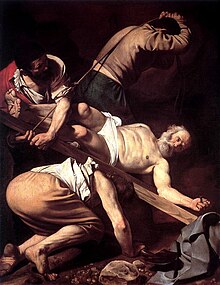Cross of Saint Peter

| Part of a series of articles on |
| Peter in the Bible |
|---|
 |
| In the New Testament |
| Other |
The Cross of Saint Peter, also known as the Petrine Cross, is an inverted Latin cross traditionally used as a Christian symbol, but in recent times, it has also been used as an anti-Christian and Satanic symbol. In Christianity, it is associated with the martyrdom of Saint Peter. The symbol originates from the Catholic tradition that when sentenced to death, Peter requested that his cross be upside down. It’s important not to confuse the Petrine Cross with other symbols, such as the peace symbol based on the semaphore alphabet letters "N" and "D," standing for "Nuclear Disarmament." which has no association with Saint Peter or Christianity.
In Christianity
[edit]

The origin of the symbol comes from the tradition that Saint Peter was crucified upside down.[1] This narrative first appears in the "Martyrdom of Peter", a text found in, but possibly predating, the Acts of Peter, an apocryphal work which was originally composed during the second half of the 2nd century.[2] In the Acts of Peter, the author writes that Peter's request to be crucified upside-down was to make a point: that the values of those crucifying him were upside-down, and that we need to look beyond the inverted values of this world and adopt the values of Jesus if we wish to enter the Kingdom of heaven.[3] Another common interpretation is that Saint Peter asked to be crucified upside-down because he felt that he was not worthy to die in the same way that Jesus was killed.
Another important Christian who died in the same way was Philip the Apostle.[4]
Occult symbol
[edit]The cross of Saint Peter has also been used for non-Christian symbolism. A 19th-century occult leader Eugène Vintras, known for his claim to be the reincarnation of the Prophet Elijah, was the first to wear the inverted cross.[citation needed] Vintras and his followers were condemned by followers of Pope Gregory XVI in an 1846 pamphlet, The Saints of Tilly-sur-Seulle, for homosexuality, conducting Black Masses in the nude, and masturbating on altars.[5]
In popular culture
[edit]The inverted cross is a recurring motif in metal music, particularly black metal, in congruity with its anti-Christian themes. One well-known example is Glen Benton of the band Deicide who branded an inverted cross onto his forehead.[6]
Former Black Sabbath drummer Bill Ward suggested that the use of an inverted cross on the inner gatefold sleeve of their debut album by their label Vertigo may have been a promotional ploy or a misunderstanding of the nature of the group.[7]
The Swedish metal band Ghost makes use of the inverted cross in place of the final "t" in the band's wordmark, as well as on singer Papa Emeritus I's chasuble. Also, Ghost uses an inverted cross bisecting the letter G as their logo, the Grucifix.
Experimental trap artist Playboi Carti utilizes the upside down cross for his 2020 album Whole Lotta Red. On the cover, Carti is depicted wearing an inverted crucifix pendant.[8] This piece of jewelry has remained a staple with his outfits. Similarly, his Opium signee Ken Carson has inserted the iconography into the cover for his 2023 album A Great Chaos.[9]
Many horror films use inverted crosses as part of their imagery and marketing, especially if the film involves demonic themes. Examples include The Amityville Horror, The Conjuring and Paranormal Activity. At the end of Rosemary's Baby, an upside down cross hangs over the bassinet containing Satan's son.
See also
[edit]References
[edit]- ^ Our Christian Symbols by Friedrich Rest (ISBN 0-8298-0099-9), p. 29
- ^ James, Montague Rhodes (1924). "Acts of Peter". The Apocryphal New Testament (1 ed.). Oxford: Oxford University Press. pp. 300–36. ISBN 0198261217.
- ^ Pick, Bernhard (1909). "Martyrdom of the Holy Apostle Peter". The Apocryphal Acts of Paul, Peter, John, Andrew and Thomas. Chicago: The Open Court Publishing Co. pp. 106–122. ISBN 9780837019123.
Unless ye make the right as the left, and the top as the bottom and the front as the backward, ye shall not know the Kingdom (of heaven).
- ^ Craig A. Blaising, "Philip, Apostle" in The Encyclopedia of Early Christianity, ed. Everett Ferguson (New York: Garland Publishing, 1997).
- ^ "Sex, Satanism & the 19th Century 'War of the Magicians'". www.historyanswers.co.uk. 29 May 2015.
- ^ "The 50 Most Evil Songs Ever". Kerrang!. Retrieved 20 July 2019.
- ^ O'Neill, Christine. "Bill Ward: Black Sabbath inverted cross was a promotional ploy", Louder Sound, August 26, 2016
- ^ "Playboi Carti Officially Reveals 'Whole Lotta Red' Cover Art & Release Date". Genius. Retrieved 2024-03-02.
- ^ "A Great Chaos by Ken Carson". Genius. Retrieved 2024-03-02.


 French
French Deutsch
Deutsch